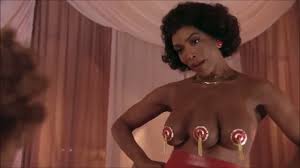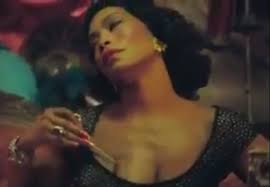 Angela Bassett has had a long and diverse career on television and film, but there’s something she’s never been asked about any of the characters she’s played: Is she or isn’t she a she?
Angela Bassett has had a long and diverse career on television and film, but there’s something she’s never been asked about any of the characters she’s played: Is she or isn’t she a she?
Until now. As Desiree Dupree on FX’s “American Horror Story: Freak Show,” that question hung in the air until a recent episode.
Bassett joined the “AHS” ensemble last year when she appeared in “Coven” as New Orleans voodoo queen Marie Laveau. Most of her scenes than were with Kathy Bates and Jessica Lange. This year, she mostly plays off Michael Chiklis and Emma Roberts.
The character of Desiree was introduced to the audience as being “intersex,” something that in a bygone era was called a hermaphrodite. But while her biological and gender identity was recently revealed, Bassett says she’s still in the dark about her character’s full story arc — and also how Desiree and Marie might be linked in a larger “American Horror Story” universe, as co-creator Ryan Murphy recently alluded.
The Oscar-nominated actress spoke by phone recently to talk about her character’s evolution, the breakup of her relationship with Dell, the character played by Michael Chiklis, and the nitty-gritty details of shooting with an uncomfortable three-breast prosthetic, Desiree’s signature characteristic. Here is an edited version of the conversation:
Q: When you signed on for “Freak Show,” did you know what the part was? What was your reaction when you found out what the part was?
Angela Bassett: I didn’t have a clue whatsoever what the part might be, what it might encompass, when I signed on. I just knew I had a great time the previous year, and if that was any indication, it was going to be a wild ride. I think it was about two weeks before I was scheduled to come down to start shooting that I got the hot off the press script. I sat down to read it to see and I remember wondering, “Now, how am I going to know who I am?”
Then you read the stage direction, “African American woman in her 40s, hermaphrodite, three breasts, and a ding-a-ling.” You’re like, oh, my gosh. You immediately close the pages, and have to walk around, and process that for a minute. You’re thinking, “What does that mean?” If they thought I was crazy demonic last year, what are they going to think this year? I just knew that it was absolutely going to be something that I had never done before. What does an actor crave, but new challenges? This certainly was going to be one of those.
Q: Do you feel like the “American Horror Story” cast is sort of a family of performers, and do you feel like more of a part of that now that this is your second time on the show?
AB: Absolutely. I feel like it is a traveling troupe of performers. This year I feel more a part of the family. You know, having been here before, having established those relationships, not the brand-new girl. We’ve got some other new faces. I feel like I’ve been around the block at least one time with them. I feel more comfortable. I was excited. I’m still excited, but I feel more a part of the family this year, most definitely.
Q: How does it feel to try on another character? Is there a learning curve? Is that the challenge within itself?
AB: As an actor you’re used to putting on characters, taking them off, becoming someone else, doing your research, working on that. I think what I found most challenging about television and shedding one character and having to come up with another is that there’s this lag time before I get to actually see what the characters are looking like, or sounding like, or how they’re coming across. We start filming in July and the first episode is in October. As an actor who wonders if you’re getting it right because you don’t have the immediate reaction of the audience just yet — that’s the little caveat. I can’t say it’s a real crazy frustration. If there were something that you had to call that, that would be it for me.
Q: Now that we know Desiree is 100% female, is that going to change how you approach the character and how Desiree acts?
AB: No. I don’t think it’ll change how I approach or how she acts. I think she’s comfortable with who she is, by and large. I think she’s just had to find a way to work and survive in a world that she’s always been reaching for what she calls normalcy, to have a family, a real family, and children of her own. I don’t think it’s going to change and make her more feminine or whatever it might be. They might write her so differently, so I’m open, but I don’t anticipate it’ll change the way that she behaves. I think what influences that is how she’s treated, how she’s treated by others.
Q: Do you think she might demand a different kind of treatment now, especially from Dell?
AB: Well, she’s walked out on him. She does demand a different kind of treatment. I guess honesty. Honesty for one, but that’s just not a desire of her as a freak, it’s just desire for her as a human being.
Q: How does your character view Michael Chiklis’? Do you think that she really sees the good in him in spite of his being kind of a bully, and a monster?
AB Yes. I think that there was a time when he was kind, and good to her, and believed in her, and made her feel valuable and special. I think that there have been moments over those years when they’ve been together where he’s crossed the line with her in the things that he says. He’s begged for forgiveness. It’s that same old thing, sometimes it happens, when people are abusive physically. I think there’s been maybe some emotional abuse throughout the years, but … never crossing the line, and completely crossing the line, or she’s weighing, if I give this up, what do I lose? Can I move on from this? Can we move on from this? Can we remain together?
I think there has come a point where he crossed the line of no return. She thought she knew who he was, but she found out she was living with the enemy. There’s something about him that was dishonest and disloyal. They were there for each other. They told each other their painful truth. I think he crossed the line. Sometimes that happens and you can’t go back. You can’t make yourself go back.
Q: What’s the process that turned you into Desiree? How does she get that third breast and how long does it take to put on?
AB: Well, I go into my regular makeup artist. She applies the appliance to me, so that it’s there basically. Then I go over to the special effects trailer where her husband makes sure the edges and everything sort of blend seamlessly. From there, he and the other special effects gentlemen will begin to apply the paint. … They spray it on. They’ll start with the brown. They’ll go to the red, and yellow, and green. It’s amazing these colors and undertones that they claim you possess. You’re like, oh, those are weird, weird colors. Then he’ll take a photograph of it to make sure that it appears as if it’s my own and based on that he’ll maybe go in, and do so more painting, and carry on.
It takes maybe from start to finish about an hour, just enough time to check out a Netflix episode of “Orange Is the New Black” or something.
Q: What was your initial reaction when you first tried on the prosthetic?
AB: Well, I was glad it wasn’t on my face. I’m claustrophobic. The initial appliance was extremely heavy. I think it was made of silicone. It started out fine, but after about hour number 12, it became hot and heavy. I believe it started sagging, which I’m like, what is the point of having three sagging breasts? No, this is not good. They reworked it and made it out of foam, which I was so, so pleased about because it’s the difference of night and day. Still, after about 12 hours of that internal heat, you begin to sweat. You begin to itch. You can’t really provide relief because you can’t get to yourself. You’re scratching foam. It’s much lighter. It’s much more bearable. I guess I’ve grown accustomed.
(“American Horror Story: Freak Show” airs on FX Wednesdays at 10 p.m. ET/PT.)


